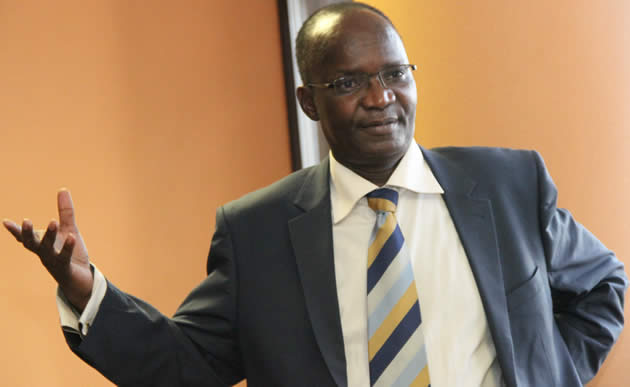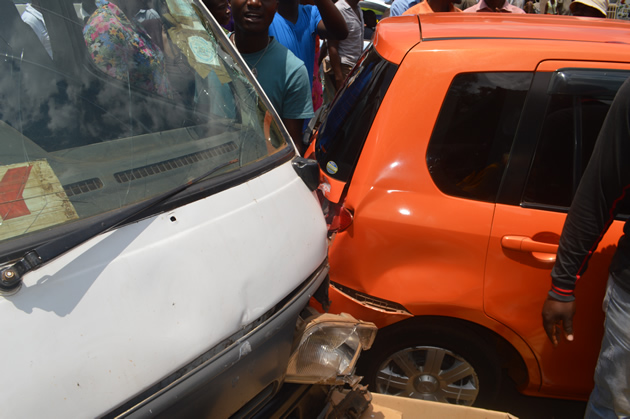LATEST: Russian Foreign Minister Sergey Lavrov’s speech at the 51st Munich Security Conference, 2015

THE last year’s developments confirmed the correctness of our warnings against profound, systemic problems in the organisation of European security and international relations in general.
I would like to remind you of the speech delivered by Russian President Vladimir Putin from these stands eight years ago.
The structure of stability, based on the UN Charter and the Helsinki principles, has long been undermined by actions of the Unites States and its allies in Yugoslavia, which was bombed, as well as in Iraq and Libya, NATO’s expansion to the east and the creation of new lines of separation.
The project of building a “common European home” failed because our western partners were guided by illusions and beliefs of winners in the Cold War rather than the interests of building an open security architecture with mutual respect of interests.
The obligations, solemnly undertaken as part of the OSCE and the Russia-NATO Council, not to ensure one’s own safety at the expense of others’ remained on paper and were ignored on practice.
The problem of missile defence is vivid evidence of the powerful destructive influence of unilateral steps in the development of military capabilities contrary to lawful interests of other states.
Our proposals on joint operation in the anti-missile field were rejected. In exchange we were advised to join the creation of global US missile defence, strictly according to Washington’s templates, which, as we underlined and explained based on facts a number of times, carries real risks for Russian nuclear deterrence forces.
Any action undermining strategic stability will inevitably result in counter measures. Thus, long-term damage is inflicted upon the entire system of international treaties dealing with control over armaments, the feasibility of which directly depends on the missile defence factor.
We do not even understand what the United States’ obsession with creating a global missile defence system can be connected with.
With aspirations to indisputable military supremacy? With faith in the possibility to resolve issues technologically, whereas these issues are in reality political?
In any case, the missile threats did not become weaker, but a strong irritant emerged in the Euro-Atlantic region, and it will take a long time to get rid of it.
We are ready for this. Refusal of the United States and other NATO members to ratify the Agreement on Adaptation of the Treaty on Conventional Armed Forces in Europe, which buried this treaty, was another destabilising factor.
At the same time, our US colleagues are attempting to lay the blame on Russia in each complicated situation they themselves created.
Let’s take the discussions, which have revived recently, on the Intermediate-Range Nuclear Forces Treaty (the INF Treaty). Specialists are well aware of the United States’ actions, which are in conflict with the spirit and the letter of this document.
For instance, as part of the creation of a global missile defence system, Washington commissioned a large-scale programme of creating target missiles with characteristics similar or close to land-based ballistic missiles, prohibited by the aforementioned treaty.
Unmanned fighting vehicles, widely utilised by the US, fall within the treaty’s definition of intermediate-range cruise land-based missiles. The treaty directly prohibits ABM launchers, which will soon be deployed in Romania and Poland, because they can be used to launch intermediate-range cruise missiles.
While refusing to acknowledge these facts, our US colleagues assert they have some “substantiated” claims against Russia with respect to the INF Treaty, but diligently avoid specifics.
With due account of these and many other factors, attempts to narrow down the current crisis to last year’s developments, to our mind, means falling into dangerous self-deception.
There is a pinnacle in the course pursued by our western colleagues in the past quarter of a century on preserving their domination in world affairs by all possible means, on seizing the geopolitical space in Europe.
They demanded of the CIS countries – our closest neighbours, connected with us by centuries economically, historically, culturally and even in terms of family ties – that they make a choice: “either with the West, or against the West.” This is a zero-sum logic which, ostensibly, everyone wanted to leave in the past.
The strategic partnership of Russia and the European Union failed the test of strength, as the EU chose a path of confrontation over the development of mutually beneficial interaction mechanisms.
We cannot help remembering the missed opportunity to implement Chancellor Merkel’s initiative put forward in June 2010 in Meseberg, to create a EU-Russia Committee on Security and Foreign Affairs at the level of foreign ministers.
Russia backed that idea but the European Union rejected it. Meanwhile, this constant dialogue mechanism, if it were to be set up, would allow for solving problems faster and more effectively, and for resolving mutual concerns in a timely manner.
As for Ukraine itself, unfortunately, at each stage of the crisis’ development, our American colleagues, and under their influence, also the European Union, have been taking steps leading to escalation.
This happened when the EU declined to involve Russia in the discussion of the consequences of implementing the economic block of the Association Agreement with Ukraine, which was followed by direct support of a coup d’etat, and anti-government riots prior to that.
This also happened when our western partners kept issuing indulgences to the Kiev authorities, who, rather than keeping their promise to launch nation-wide dialogue, began a large-scale military operation and labelled “terrorists” all those citizens who defied the unconstitutional change of power and the rule of ultranationalists.
It is very hard for us to explain why many of our colleagues fail to apply to Ukraine the universal principles of settling internal conflicts which presuppose, above all, an inclusive political dialogue between the protagonists.
Why do our partners in the cases of Afghanistan, Libya, Iraq, Yemen, Mali and South Sudan, for instance, urge the governments to talk with opposition, with rebels, in some cases even with extremists, whereas in the Ukrainian crisis, our partners act differently, in fact, encouraging Kiev’s military operation, going so far as to justify or attempt to justify the use of cluster munitions.
Regretfully, our western colleagues are apt to close their eyes to everything that is said and done by the Kiev authorities, including fanning xenophobic attitudes.
Let me quote: “Ukrainian social-nationalism regards the Ukrainian nation as a blood-race community.” Which is followed by: “The issue of total Ukrainisation in the future social-nationalist state will be resolved within three to six months by a tough and balanced state policy.”
The author of those words is Andrey Biletsky, the commander of the Azov regiment, which is actively engaged in the military activities in Donbass. Some other activists who gained a position in politics and power, including Dmitry Yarosh, Oleg Tyagnibok and the leader of the Radical Party in the Verkhovna Rada Oleg Lyashko, publicly called a number of times for an ethnically clean Ukraine, for the extermination of Russians and Jews. Those statements failed to evoke any reaction in the western capitals. I don’t think present-day Europe can afford to neglect the danger of the spread of the neo-Nazi virus.
The Ukrainian crisis cannot be settled by military force. This was confirmed last summer when the situation on the battlefield forced the participants to sign the Minsk Accords.
It is being confirmed now as well, when the next attempt to gain a military victory is failing. Yet regardless of all that, more loud calls are being made in some western countries to step up support of the Kiev authorities’ vector towards militarisation of society and the state, to “infuse” Ukraine with lethal weapons, to drag it into NATO.
There is hope in the increased opposition in Europe to such plans, which can only make the tragedy of the Ukrainian people worse.
Russia will continue strive for establishing peace. We are consistently calling for the cessation of military activities, the withdrawal of heavy weapons and the start of direct talks between Kiev and Donetsk and Lugansk on practical steps to restore the common economic, social and political space within the territorial integrity of Ukraine.
Numerous initiatives by President Putin were dedicated to exactly that within the Normandy format, which helped launch the Minsk process, and our further efforts on its expansion, including yesterday’s talks in the Kremlin between the Russian, German and French leaders.
As you know, these talks are ongoing. We believe that there is every possibility we will reach results and agree on recommendations that will really allow the parties to untie the knot of this conflict.
It is crucial that everyone should be aware of the real magnitude of the risks. It is high time we abandon the custom of considering every problem separately, unable to see the forest for the trees.
It is time to give a comprehensive assessment of the situation. The world is now facing a drastic shift connected with the change of historical eras. The “labour pains” of the new world structure are manifested in increased proneness to conflicts in international relations. If short-sighted practical decisions in the interest of the nearest elections at home will prevail with politicians over a strategic global vision, the risk will emerge of losing global management control.
Let me remind you that at the onset of the Syrian conflict many people in the West advised not to exaggerate the danger of extremism and terrorism, stating that the danger will somehow dissipate by itself, while attaining the regime change in Damascus was a key priority.
We see what has come out of it. Huge areas in the Middle East, in Africa, in the Afghan-Pakistani area are dropping out of legitimate government control. Extremism is spilling into other regions, including Europe.
Risks of WMD proliferation are intensifying. The situation with the Middle East settlement, and in other regional conflict areas, is acquiring an explosive character. No adequate strategy on curbing those challenges has been worked out so far.
We are still confident that the overall complex of issues could be resolved much more easily, if the largest players agreed on strategic landmarks in their relations. Recently Helene Carrere d’Encausse, permanent secretary of the Academie française, whom I hold in high esteem, said that a real Europe may not exist without Russia.
We would like to see if this perspective is shared by our partners, or if they are inclined to keep deepening the split in the common European space and setting its fragments in opposition to each other.
Do they want to build a security architecture with Russia, without Russia, or against Russia? Of course, our American partners will also have to answer that question. – Russian Embassy, Harare, Zimbabwe









Comments